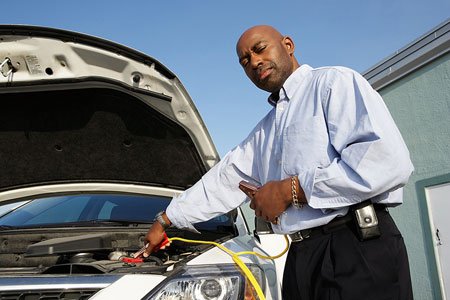TOWSON, Md. — The heat is on and most of Maryland is facing the year’s first potential for a string of days with temperatures exceeding 90 degrees, which coincides with the first day of the summer solstice on Saturday, June 21. This may be great news for sun lovers, but it is also a warning signal to drivers to prepare their vehicles for the dangers of high heat.
As the temperatures spike, emergency roadside assistance calls to AAA Mid-Atlantic’s switchboard will soar to the hundreds of thousands this summer. The auto club is reminding everyone to stay cool and safe in this dangerous heat, but also to be prepared for what can happen to your vehicle in this type of extreme weather.
“Heat is very hard on your car battery and all of the rubber hoses, belts and tires on your vehicle, which can make a vehicle very vulnerable to breakdowns during the summer months,” said Ben Perricone, Approved Auto Repair Territory Manager for AAA Mid-Atlantic. “Preventative maintenance can help avoid unexpected, precarious and expensive breakdowns as we head into the high heat of summer months.”
Most of us think that harsh cold weather is tough on our cars, but the high heat can be just as tough if not tougher on a car. With each day of high heat the number of calls to AAA’s call centers rises dramatically for heat-related breakdowns and most are due to a zapped car battery.
This summer will not be an exception. In fact, this “summer will be hotter and rainier than normal,” along the “Atlantic corridor,” with “the hottest periods in mid- to late June and in early to mid-July,” predicts the Old Farmer’s Almanac.
Extreme heat, especially when it lasts for extended periods, can actually take a greater toll on your vehicle than the cold of winter, cautions AAA Mid-Atlantic’s Approved Auto Repair. AAA Mid-Atlantic offers car owners and do-it-yourselfers (DIYs) the followings tips for summer automotive care.
Before hitting the road:
·Make sure your vehicle is in top operating condition before leaving home.
·Check all fluids including the coolant level.
·Never remove the radiator cap when the engine is hot, you can be seriously scalded.
·Inspect your brakes, battery, shocks, filters and pump.
·Service the cooling system as recommended by the manufacturer. This is typically necessary every two to five years.
·Keep your tires at normal pressure. Soft tires generate heat, which can lead to a blowout.
·Install AAA’s free apps to plan your trip and members can request roadside assistance.
Once on the road:
·Keep an eye on your gas, oil and engine temperature gauges.
·Should the vehicle overheat, pull off the road, shut the engine off immediately and allow the vehicle to cool.
·Carry an emergency kit: mobile phone and charger; a flashlight with extra batteries; a first-aid kit; drinking water; extra snacks for your travelers and any pets; battery booster cables; and emergency flares or reflectors.
For more information, visit: www.AAA.com.
